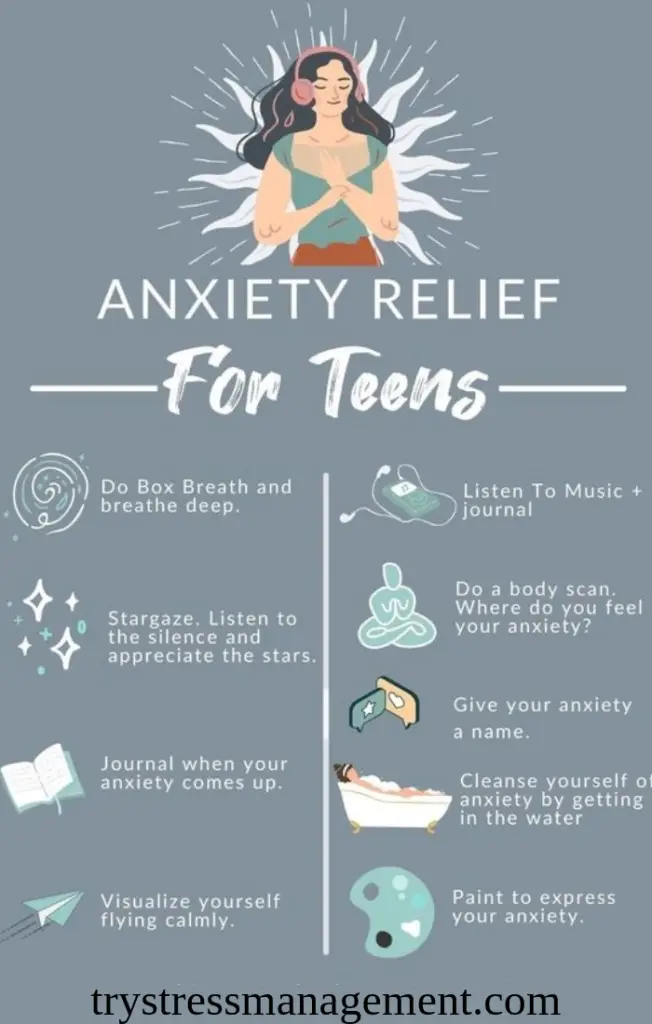Welcome to the intricate world of adolescence, where the challenges of growing up often intertwine with the complexities of stress. In “Unlocking the Struggles: Exploring the Causes of Stress Among Teenagers and Coping Strategies,” we embark on a journey to unravel the layers of stress that teenagers navigate daily. From academic pressures to social dynamics and technological influences, we’ll delve into the multifaceted sources of stress.
Moreover, we’ll equip both teenagers and those supporting them with effective coping strategies to foster resilience and well-being. Join us as we shed light on the often-overlooked aspects of teenage stress and empower the younger generation with tools to navigate these formative years with strength and balance.
Table of Contents
Importance of Addressing Stress in Teenagers
Addressing stress in teenagers is of paramount importance as it directly influences their physical, emotional, and mental well-being during a crucial phase of development. Teenagers encounter a myriad of stressors, including academic demands, social pressures, and the rapid changes associated with adolescence. Chronic stress not only affects their immediate state but can also have lasting impacts on their future health and resilience.
By addressing stress in teenagers, we invest in their overall growth, helping them build crucial coping skills, emotional intelligence, and resilience that will serve them well into adulthood. Additionally, fostering a supportive environment that acknowledges and addresses stress empowers teenagers to navigate challenges with confidence, promoting a healthier and more balanced transition into adulthood.
Common Causes of Stress Among Teenagers
Academic pressures:
The intense academic environment, marked by exams, assignments, and expectations, is a significant stressor for teenagers. Striving to meet academic standards, excel in exams, and secure a future path can create immense pressure, impacting their mental well-being.
Social Challenges:
Navigating complex social dynamics, including friendships, peer relationships, and societal expectations, adds to the stress teenagers experience. Issues like bullying, peer conflicts, or the desire for social acceptance contribute to emotional strain.
Family Dynamics:
Family dynamics play a crucial role in a teenager’s life, and conflicts or disruptions within the family unit can induce stress. Factors such as parental expectations, divorce, or communication breakdowns can significantly impact a teenager’s emotional state.
Peer Pressure:
Peer pressure is a common stressor as teenagers often feel the need to conform to societal norms set by their peers. The fear of being judged or excluded can lead to decisions that may not align with their values or preferences.
Future Uncertainties:
Teenagers often grapple with uncertainties about their future, including career choices, college decisions, and the transition to adulthood. The pressure to make crucial life decisions can be overwhelming, causing stress about the unknown path ahead.
Impact of Stress on Teenagers
Emotional Consequences:
Stress hits teenagers hard emotionally. It’s not just about feeling anxious; it’s like being on an emotional rollercoaster. Stress cranks up anxiety levels, overwhelms them, and in some cases, it even brings on bouts of depression. You’ll see it in mood swings, irritability, and a sense of hopelessness, all of which mess with their mental well-being.
Physical Effects:
Stress isn’t satisfied with messing with their heads; it goes for the body too. Teenagers dealing with stress might get hit with headaches, stomachaches, constant fatigue, and a messed-up sleep schedule. And that’s not all – prolonged stress can even weaken their immune system, making them more prone to getting sick.
Behavioral Changes:
Stress doesn’t leave behavior untouched. You’ll notice teenagers becoming more withdrawn, tweaking their eating habits, or even diving into risky stuff as a way to cope. These changes in behavior are like signals, telling us there’s stress underneath that needs attention and support.
Academic Performance:
Teenagers’ academic game takes a hit when stress comes into play. It messes with their focus, memory, and decision-making, creating a recipe for a decline in grades. The pressure to shine academically only adds fuel to the stress fire, creating a loop that messes with their overall well-being.

Identifying Signs of Stress in Teenagers
Behavioral Changes:
Spotting stress in teenagers often involves noticing shifts in their behavior. If they were outgoing and suddenly become more withdrawn, or if their usual habits take a sudden turn, these could be signs of stress. Keep an eye out for changes in social interactions, eating patterns, or participation in activities.
Emotional Indicators:
Emotions are like signals, and when stress hits, it sends out some clear signs. Watch for heightened irritability, mood swings, or sudden emotional outbursts. Stress can also make them more sensitive or reactive, so if they’re exhibiting unusual emotional responses, it might be time for a heart-to-heart.
Physical Symptoms:
Stress doesn’t just play games with the mind; it leaves its mark on the body too. Look out for physical symptoms like frequent headaches, stomachaches, fatigue, or changes in sleep patterns. If they complain of feeling unwell without a clear medical cause, it’s worth considering stress as a potential culprit.
Coping Strategies for Teenage Stress
A. Open Communication:
Encouraging open communication creates a supportive space for teenagers to express their feelings and concerns. Actively listen without judgment, validate their experiences, and offer guidance. Knowing they can share their thoughts fosters a sense of trust and helps alleviate the emotional burden.
B. Healthy Lifestyle Habits:
Promoting healthy habits significantly contributes to stress management. Ensure teenagers maintain a balanced diet, engage in regular physical activity, and prioritize sufficient sleep. These foundational elements play a vital role in both physical and mental well-being.
C. Time Management Skills:
Teaching effective time management empowers teenagers to navigate their responsibilities without feeling overwhelmed. Help them organize tasks, set realistic goals, and create a schedule that allows for breaks. Learning to manage time efficiently reduces stress related to academic and personal commitments.
D. Seeking Support from Adults or Professionals:
Encourage teenagers to reach out for support from trusted adults, whether it’s parents, teachers, or school counselors. Sometimes, professional guidance from therapists or counselors can provide valuable tools for coping with stress and building resilience.
E. Mindfulness and Relaxation Techniques:
Introducing mindfulness and relaxation practices equips teenagers with tools to manage stress in the moment. Techniques such as deep breathing, meditation, or yoga promote a sense of calm and help them navigate challenging situations with greater ease.
The Role of Parents and Educators
Parents and educators play pivotal roles in mitigating and addressing the stress faced by teenagers. A supportive home environment, characterized by open communication and understanding, provides a crucial foundation for teenagers to express their concerns and seek guidance. Parents can actively engage in their child’s life, offering a listening ear and providing reassurance.
Additionally, educators contribute significantly by fostering a positive and inclusive school atmosphere. Implementing stress management programs, promoting a healthy work-life balance, and recognizing individual achievements can create an environment where students feel supported. Collaboration between parents and educators is essential to identify signs of stress early on and implement effective strategies that contribute to the overall well-being of teenagers.
By working together, parents and educators can create a holistic support system that empowers teenagers to navigate the challenges they face.

Seeking Professional Help
Seeking professional help is a crucial step in addressing and managing teenage stress. Mental health professionals, such as counselors or therapists, offer specialized support to teenagers dealing with overwhelming stressors. These professionals create a safe space for adolescents to explore their emotions, develop coping mechanisms, and gain insights into their challenges. Seeking professional help can provide teenagers with valuable tools to navigate stress, enhance resilience, and foster emotional well-being.
Additionally, professionals can collaborate with parents and educators to establish comprehensive strategies that promote a supportive environment for teenagers. By recognizing the importance of seeking professional assistance, teenagers can access the resources needed to build resilience and navigate the complexities of adolescence more effectively.
Tips for Teenagers to Manage Stress
Open Communication: Share your feelings with trusted friends, family members, or mentors. Talking about what’s on your mind can provide relief and support.
Healthy Lifestyle Habits: Prioritize regular exercise, sufficient sleep, and a balanced diet. Physical well-being contributes significantly to mental resilience.
Time Management Skills: Organize your schedule, set realistic goals, and break tasks into manageable steps. Effective time management reduces stress and enhances productivity.
Seeking Support: Don’t hesitate to reach out to adults, teachers, or professionals when you need guidance. Seeking support is a sign of strength, and others can provide valuable perspectives.
Mindfulness and Relaxation Techniques: Incorporate mindfulness practices, such as deep breathing or meditation, into your routine. These techniques can help calm the mind and reduce stress.
Conclusion
Embarking on the rollercoaster ride of adolescence, our guide, “Unlocking the Struggles,” takes you through the labyrinth of stress teenagers face daily. From academic pressures to social dynamics, we explore the various stressors and equip both teens and their allies with effective coping strategies. This journey goes beyond understanding causes—it’s about empowering the younger generation to navigate these formative years with resilience.
Addressing stress in teens is crucial for their overall well-being, influencing their physical, emotional, and mental health during this pivotal phase. By acknowledging stressors and offering coping tools, we invest in their growth, fostering skills that propel them into adulthood with confidence. Causes range from academic pressures to family dynamics, affecting emotional well-being, physical health, behavior, and academic performance.
Recognizing signs of stress and implementing strategies like open communication, healthy habits, and seeking support are keys to a balanced journey. Parents and educators play pivotal roles, in creating supportive environments and recognizing signs early on. Seeking professional help provides specialized support, empowering teens to navigate stress effectively. Let’s guide the younger generation towards resilience, wisdom, and balance in the complexities of adolescence.



